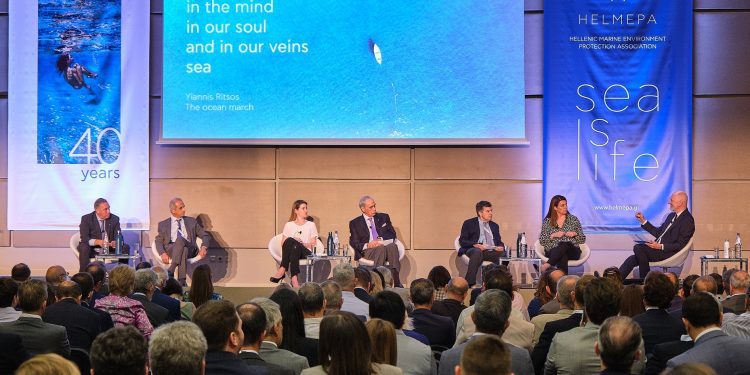Shipping is required to face the complex challenges placed by the progressively stricter IMO and EU environmental legislation and the financial issues related thereto, according to Greek Minister of Maritime Affairs and Insular Policy, Ioannis Plakiotakis.
In his keynote during this morning’s opening panel of the HELMEPA Conference on the third day of this year’s Posidonia Exhibition, Plakiotakis, referred to decarbonisation as a ‘flaming issue’ and as ‘one of the biggest challenges for shipping’.
Shipping has to secure, in the very near future, worldwide availability of safe alternative low and zero carbon fuels and the related infrastructure. We are, however, still far from there
The Minister also stressed the importance of new financial instruments and resources to fund the journey to decarbonization. As he said, “higher standards of safety and environmental performance often come from different organizations, but always at an important financial cost.”
He also added that “financing of innovative solutions for the reduction of pollution from vessels and enhancement of energy efficiency of ships, including the installation of pioneering technological equipment, or the building of ships of innovative design and systems, presupposes the existence of funding mechanisms beyond the traditional ones.”
The transition to a carbon-free future, requires that we gradually move from the current uncertainty to a safe environment that will be leading future investments and make sure that they result in the expected benefits for the environment, entailing a mix of targeted and flexible, private and public funding
He finally called on the EU and the International Maritime Research Board and Associated Fund to generously support and contribute to the required funding through sources such as the EU structural budget and other industry-led initiatives.
Next, addressing the audience via a prerecorded video message, Secretary General of the International Maritime Organisation, Kitack Lim, mentioned that in order “to decarbonise a truly global industry global solutions are needed. The goal is to ultimately decarbonise shipping and for that, there is a need to collaborate between all stakeholders to develop sustainable solutions.”
The Union of Greek Shipowners will continue to work consistently and with dedication, in order to adopt realistic and feasible solutions that will lead our industry in this new era
said Melina Travlos, President of the Union of Greek Shipowners in her speech.
Furthermore, during a powerful panel of six of Greece’s biggest shipping companies, including:
the panelists focused onESG issues in the shipping sector. As Mr. Tsakos said:
Greece is the Silicon Valley of shipping. We don’t want to be just the guinea pigs for any new legislation without been consulted first. The status of shipping is not yet appreciated because as an industry we are fragmented
Furthermore, according to Mr Pittas, “shipping has been putting far too much emphasis on the E part of the ESG equation because I believe it is the easiest to tackle.”
Putting too much energy on the E we may be losing on the S, especially because the first thing we should care for is society and the social inclusion for everybody
The importance of decarbonisation in the agenda of shipowners was also reflected in a panel discussion hosted by BIMCO. Namely, the panel addressed the barriers to transition, as it is considered to be the single most important issue facing the shipping industry on its path to decarbonisation.






